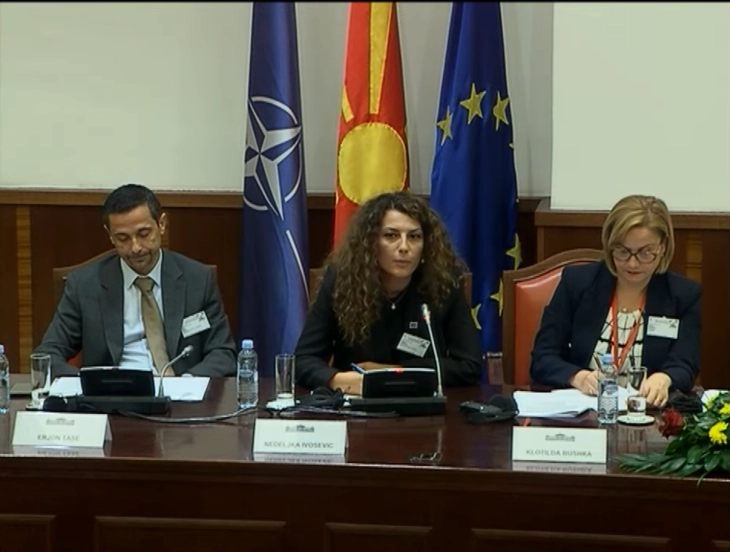Ivošević: Compulsory education about European integration, inclusion of young people in decision-making needed
- The media is one of the reasons why young people have a negative perception of the European Union. Compulsory education in primary and secondary schools is needed about European integration, and it is also important to create mechanisms to include young people in decision-making processes, Nedeljka Ivošević, Bureau member of the Advisory Council on Youth at CoE, said Friday.

Skopje, 20 October 2023 (MIA) - The media is one of the reasons why young people have a negative perception of the European Union. Compulsory education in primary and secondary schools is needed about European integration, and it is also important to create mechanisms to include young people in decision-making processes, Nedeljka Ivošević, Bureau member of the Advisory Council on Youth at CoE, said Friday.
Addressing the Conference on Inter-Parliamentary Dialogue to Further Promote the European Integration of the Western Balkans, jointly organized by the Parliamentary Assembly of the Council of Europe (PACE) and North Macedonia's Parliament, Ivošević said that in general there is a lack of systematic education about the EU and its values.
"The media plays a vital role in distributing information about European integration and is one of the reasons why young people have a negative perception of the European Union. Most of the information in the media is related to the national context and not to the EU itself. There is not enough information about the benefits of joining the EU," she pointed out.
She said it is positive that there are various programs from non-governmental organizations for information regarding the significance of European integration, however, it is not sufficiently systematically established.
"First of all, we must work on educating and informing young people about what the EU is and what the benefits are, because the majority of young people have the perception that the EU will not improve their quality of life. They believe that the EU does not mean a guarantee of stability in the region. Compulsory civic education is needed in primary and secondary schools, and it is also important to create mechanisms to include young people in decision-making processes," said Ivošević.
According to her, young people do not trust politicians, they do not trust institutions, and they believe they do not have the capacity to create positive changes in their community.
Euronews View editor Aleksandar Brezar noted that the media in the Balkans, and particularly in the Western Balkans, always deal with complicated issues when it comes to covering topics related to European integration.

"I say this based on the fact that information related to European integrations is neither covered enough nor is it given enough attention. Journalists do not have enough time to prepare to cover these topics and easily contact the necessary sources," said Brezar.
According to him, that is precisely what opens the door to fake news and misinformation. He pointed out that the Western Balkans lacks the intention to share the real information with the public.
Commenting on Euro-integration in terms of the country, Peter Hurrelbrink, director of Friedrich-Ebert-Stiftung (FES) for North Macedonia and Kosovo, said the atmosphere was polarized in the country, because the public is wondering whether this process will ever finish, whether all inappropriate demands and conditions will end.
"Europe was faced with countries that did not want to reform. It is interesting that North Macedonia wanted to reform and implemented all the requested changes. I congratulate all the countries of the Western Balkans. In Kosovo, on the other hand, there is an opinion that the credibility of the EU is disappointing, and the liberalization of the visa regime is something that is not resolved, due to the relations between Kosovo and Serbia. According to them, the EU does not have an objective approach in this dialogue," Hurrelbrink added.

Erjon Tase, executive director of the Academy of Political Studies in Tirana, said that the EU integration process should be better explained by politicians and civil society.
"More and more people believe that we cannot easily become a member of the EU, that this is just an unrealistic wish. What we need to do is realize that the process of integration needs to be better explained by politicians and civil society. It should be explained that EU integration does not only mean reaching the goal quickly, but the process itself is also important, i.e. improvement of human rights, democracy and economic development. Politicians must unite and work together, especially when it comes to integration and introducing reforms in the countries," Tase added.
Photo: Print screen







